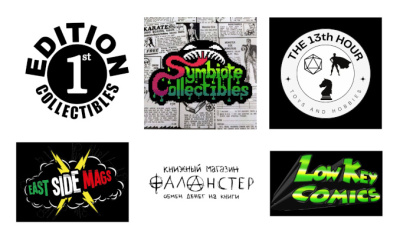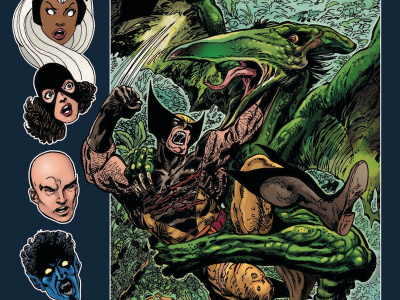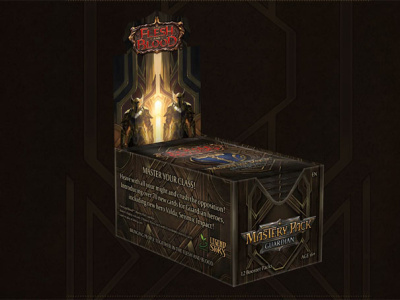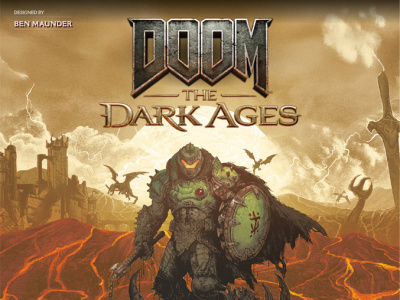ICv2 recently spoke with Marvel Publisher Dan Buckley to discuss the market and Marvel’s publishing strategies. In Part 2, we talk about the changing audience for comics and the transmedia aspect of Marvel’s business. In Part 3, we talked about Star Wars and Marvel’s publishing plans for its own universe in 2015. And in Part 1, we talked about the market, Marvel’s place in it, Marvel’s comic package, and Marvel’s graphic novel strategy.
We wanted to talk about a topic that ICv2 has been exploring (including at its conference), the "new comics customer," the growing gender diversity and other changes to the audience (see "Retailers Talk New Comics Customers"). What are you seeing in measurable changes in the gender mix of your products and particularly on something like Ms. Marvel that has a strong female starring character?
We’ll be very frank. This industry has not been known for doing a lot of consumer research. You probably have most of it. As Tom DeFalco said to me 20 years ago [doing a Tom DeFalco voice], "You know, Danny, the best research you could do is you print the book, the people buy them, then that’s the book they want to buy." We’re in an industry where the cost of investment to create a product is relatively low. In many ways it’s cheaper just to produce a book and see if it sells than to do a lot of consumer research. That’s where our medium is very different from television, movies and animation.
We’ve been aggressive in trying a lot of diverse product over the last two years. I would give huge kudos to Axel Alonzo on that. He’s been very aggressive in making sure that we have more female lead characters, that we have a more diverse palette of ethnicity in the books, and the thing that’s exciting to see is that the books are selling.
We were assessing it qualitatively just from going to cons, feedback from social media, the old method of letters, emails. Just through that qualitative data you can sense there’s a diversifying of the readership base. Obviously there’s a great impact from what’s happening in the mass media when people go to the movies and say, "Oh this is for me, too." You’ve been to cons, and you can see a definite shift in the demographic deliverance there too.
In the past, we could hold onto books that were critical darlings [but not top sellers] and move them along. Runaways was a great example of that. We’re not holding on to critical darlings right now. Ms. Marvel is a legitimate top-selling title for us in all channels. And the Lady Thor book (for lack of a better term, I’ll use the moniker) is a top-selling book for us. Part of it is Thor fans checking it out, but a lot of women came in to check it out, and say, "What is this story? I want to take part in it."
Miles [Morales] has been a legitimate hit for us with Ultimate Spider-Man. Success begets more versions of these things that will beget more success and we’re very excited about it, because the more we can broaden our base, the better it is for this form of storytelling and our business as a whole.
You launched a new kids’ site recently. Are you seeing a growing kids audience as well?
We continue to publish our screen capture books. They’re doing very well based off the animation. We continue to have success with animation on Disney XD. Ultimate Spider-Man is doing very well in Season 3; it’s having a very good season; the ratings are up compared to Season 2. We’ve been very pleased with the performance of that. Miles Morales has made his appearance in that season.
A lot of the storytelling that Dan Slott laid out is popping up in that animated series. Avengers Assembled Season 2 is still doing very well. Hulk and The Agents of S.M.A.S.H. is wrapping up its second season. And as we announced at New York Comic Con, we will be launching a Guardians of the Galaxy animated series sometime next year, which we’re very excited about (see "'Guardians of the Galaxy' NYCC Test Reel").
We are working on further sampling programs for comics in that age group. The sales performance has been pretty good in the book market, but we have to continue to support the hobby market. We feel it’s important to support it.
The strategy of the kids websites, which are Marvel Kids and then franchise-focused around Spider-Man and Avengers, has been met with a great deal of positive feedback and strong traffic. In the coming months, there will be access to reading digital comics on that site also. We have to adjust the reader to make sure it works properly in the interface that it has to plug in.
You’ll see us be more aggressive in the sampling in the next six to 12 months with the kids’ comic products. I just can’t get into any details.
We work very closely with DPW [Disney Publishing Worldwide] in the kids’ publishing space. We’ve been very happy with the younger age comic performance for us in the book market, but we as Marvel also have more kids published product than we’ve ever had. Over the last five years as we developed our relationship with DPW, we actually have a very strong juvenile publishing program that is a combination of us publishing our comics and then DPW doing a variety of different formats from storybooks to young readers and all that material.
We’d like to talk about the transmedia aspect of Marvel’s business. There’s a perception that Marvel is changing its print continuity to align with the Marvel Cinematic Universe continuity. Does that happen?
I think people like to jump to conclusions. I’m going to be very clear. Let’s go back to 12 years ago. We all remember picking up our X-Men books in the 70s, 80s, and 90s. The Professor would go in to put Cerebro on and he’d wear a helmet in a room, and whatever room that was and whatever it looked like was up to the artist du jour. But that room now, after the X-Men movie when he rolled into that big open area with the metallic globe that he is sitting inside of with the ramp, and then he puts the helmet on, you go into a Marvel comic now and that’s what that room looks like. The movie defined the mass market perception of what Cerebro looks like. The comics guys are looking at it and thinking, "That’s pretty cool, I think I’ll do that!" So, to say that one medium does not influence the other a great deal would be lying.
The fact is the comics universe continuity is driven by editorial and the creative people within that area: the writers and artists involved with the editorial staff, and business management people in the publishing group. All of those people are well aware of what we’re looking to do with our television shows, movies and animation, me being one of those people. We allow the publishing people to tell the stories that they’re telling, but when a movie comes out and does something with a character that we find to be cool and also is very defining of the character, that will probably start influencing what the comic continuity will start looking like because the creators we have writing those products are influenced by that movie.
I’ll give an example forThor. When Kirby kicked off Thor, it was sci-fi. If you look back at that material he drew with Thor, it was from his imagination. The outfits looked very sci-fi, for lack of a better term. Through the years, through a variety of different artists’ influences, and from their own imaginations, I’d say it felt more like Norse mythology or The Lord of the Rings. But now the movie’s come back. The feeling of what Asgard looks like (where Thor is from) feels more sci-fi again because we leaned into that with the movie.
So there’s no way that these movies, which are seen by millions of people, are not influencing what we’re doing in the books, but we’re not looking to align continuity between the two storytelling worlds because, frankly, that would be a venture into madness.
People can see what Marvel’s done over the years. It’s pretty complex what we’ve pulled off from a continuity and context standpoint through the last 50 to 75 years. It’s pretty impressive. To try to take comic continuity and tie it into movie continuity? Believe me, I work in both the movies and live-action television shows, and it is hard enough to synch those two things up. I’m not looking to invite 70 books a month into the equation.
So to say that both mediums have influence on each other, yes. They will creatively bleed into each other; people are going to steal good ideas from each other. That’s always going to happen. A good example of that kind of working influence is the S.H.I.E.L.D. TV show. For the most part the [Marvel’s Agents of] S.H.I.E.L.D. TV show is a collection of characters that never existed before. Coulson is the only character that existed before that show kicked off (and obviously I’m talking about the core cast members; we’ve also invited some guests). We’ve figured out what those characters meant, how they interacted, how they fit in the Cinematic Universe and how they fit in Marvel as a whole, because we never told the story about Melinda May or Skye or any of these characters.
So we got into that, we’re figuring it out in these books, and the television show operates independently, but as I jokingly said at New York Comic Con, we’re making those guys legit now by launching The Agents of S.H.I.E.L.D. comic book (see "Mark Waid Writing New 'S.H.I.E.L.D.' Series"). And that book is featuring those characters from the television show, but it’s that group of characters and how they would be in the publishing universe.
Because in the publishing universe there’s all sorts of superheroes around. They’re really who they are, and you can do certain things, so their continuity in that comic universe will be those characters in that universe. But they’re going to act, breathe and operate in the comics universe in the continuity of the comics universe. In the television universe they’ll still be in the Cinematic Universe doing what they’re doing. And we even have to deal with the oddity that’s been revealed in the S.H.I.E.L.D. TV show that Skye is actually Daisy. There is a character, Daisy Johnson, that existed in the comics universe that we revealed on the TV show is actually Skye.
One is not overriding the other, it would be way too hard. But they do influence each other and that’s a lot of fun.
Click here for Part 3.

The Changing Audience and Transmedia and Comics
Posted by ICv2 on January 19, 2015 @ 4:05 am CT
MORE COMICS
Shop Talk, July 2025
July 25, 2025
All this and more in this month's edition of Shop Talk, our roundup of retailer news.
In Which Jean Grey Survives the Dark Phoenix Saga
July 25, 2025
What If…? Jean Grey survived the end of the Dark Phoenix saga?
MORE NEWS
Supplementary Booster Set for the Guardian Class
July 25, 2025
Legend Story Studios will release Mastery Pack Guardian, a supplementary booster set for Flesh and Blood TCG, into retail.
By Modiphius Entertainment
July 25, 2025
Modiphius Entertainment announced two new Doom board games.








